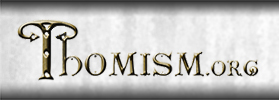- Objective Potency (a.k.a. Pure Possibility or Logical Possibility)
The capacity of a nonexistent being for existence ⤵
- Absolute Possibility (a.k.a. Intrinsic Possibility or Internal Possibility or Negative Possibility)
The capacity considered absolutely in itself
(e.g. the existence of a chair is intrinsically possible, whereas the existence of a square circle is intrinsically impossible)
- Relative Possibility (a.k.a. Extrinsic Possibility or External Possibility or Positive Possibility)
The capacity considered relative to another being's power to produce it ⤵
- Natural Possibility (a.k.a. Physical Possibility)
The capacity considered relative to another being's natural power to produce it
(e.g. the existence of Shakespeare's Works being produced by a human is naturally possible, whereas the existence of Shakespeare's Works being produced by the color blue is naturally impossible)
- Moral Possibility
An ethically permissable possibility which can be produced by a rational agent
Note: Some might specifically call this "morally good" or "morally advisable" possibility since the term "moral possibility" can be used to include any act done by a rational agent regardless of whether it is good or evil
(e.g. eating healthy is often a morally good possibility, whereas murdering an innocent person is not)
- Plausible Possibility (a.k.a. Plausibility)
A possibility which does not involve serious difficultly for another being's power to produce it
(e.g. for a typical person, swimming across a small pond is possible without serious difficulty, whereas swimming across the Atlantic Ocean is not)
- Subjective Potency (a.k.a. Physical Potency or Real Potency)
The capacity of something already existing for another act or perfection
Note: This is considered "Potency" in the more proper sense of the term ⤵
- Active Potency (a.k.a. Operative Potency or Power)
The capacity to do or make something
Note: This is also technically considered a kind of actuality (specifically, First Actuality) relative to the thing that possesses it, but it also a kind of potency relative to what it can do
(e.g. a horse has the active potency for galloping)
- Passive Potency (a.k.a. Receptive Potency or Potentiality)
The capacity for receiving something, to be acted on, to be modified, etc.
Note: While "Potentiality" is sometimes used synonymously with "Potency," it usually refers to Passive Potency more specifically
(e.g. a horse has the passive potency for being whipped)

